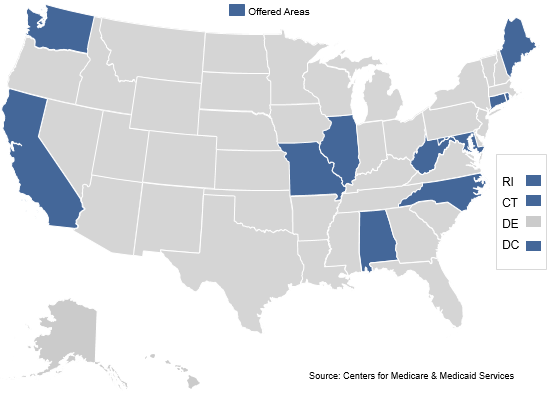CMS worked collaboratively with private non-profit organizations and across the Department of Health and Human Services (HHS) to develop this demonstration. Partners included the National Association of Psychiatric Health Systems (NAPHS), and, within HHS, the Office of the Assistant Secretary for Planning & Evaluation (ASPE) and the Substance Abuse and Mental Health Services Administration (SAMHSA).
This Demonstration tested whether Medicaid could support higher quality care at a lower total cost by reimbursing private psychiatric hospitals for certain psychiatric services for which Medicaid reimbursement has historically been unavailable.
The Participating States

There were 11 states and DC participating in the Medicaid Emergency Psychiatric Demonstration.
- Read more about participants in the Medicaid Emergency Psychiatric Demonstration
States were selected competitively through a rigorous independent panel selection process. Each State’s application was carefully reviewed, scored and ranked. This Demonstration provides $75 million over 3 years to the following State participants:
Alabama Illinois North Carolina California Maine Rhode Island Connecticut Maryland Washington District of Columbia Missouri West Virginia
Background
Currently Medicaid does not reimburse psychiatric institutions, referred to in Medicaid as “institutions for mental disease” (IMDs) for services provided to Medicaid enrollees aged 21 to 64. This restriction is known as Medicaid’s IMD exclusion.
Due to the IMD exclusion, many Medicaid enrollees with acute psychiatric needs, such as those expressing suicidal or homicidal thoughts, are diverted to general hospital emergency departments, which often lack the resources or expertise to care for these patients. For the Medicaid beneficiary, this may result first in a delay in treatment, and then when treatment is provided, inadequate care. General hospitals may delay the provision of care until a bed becomes available, or inappropriately assign them to medical beds.
Initiative Details
The Medicaid Emergency Psychiatric Demonstration was established under Section 2707 of the Affordable Care Act to test whether Medicaid programs can support higher quality care at a lower total cost by reimbursing private psychiatric hospitals for certain services for which Medicaid reimbursement has historically been unavailable.
This demonstration provided up to $75 million in federal Medicaid matching funds over three years to enable private psychiatric hospitals, also known as IMDs, to receive Medicaid reimbursement for treatment of psychiatric emergencies, described as suicidal or homicidal thoughts or gestures or determined to be a danger to self or others, and, provided to eligible Medicaid enrollees aged 21 to 64 who had an acute need for treatment. Historically, Medicaid has not paid IMDs for these services without an admission to an acute care hospital first.
On August 9th, 2011, all State Medicaid Program Directors were invited to submit proposals to be considered through a competitive process. States were also required to specify how they would track patients and monitor stabilization and ensure proper patient discharge planning, as required by the law.
Evaluations
Latest Evaluation Reports
- Medicaid Emergency Psychiatric Demonstration - Cures Act Report to Congress (PDF)
- Medicaid Emergency Psychiatric Demonstration Cures Act Report to Congress - Appendices (PDF)
Prior Evaluation Reports
- Medicaid Emergency Psychiatric Demonstration - Final Report (PDF)
- Medicaid Emergency Psychiatric Demonstration - Final Report Appendices (PDF)
- Evaluation of the Medicaid Emergency Psychiatric Demonstration – Report to Congress (PDF)
Additional Information
- Fact Sheet
- Frequently Asked Questions
- Demonstration Design and Solicitation (PDF)
- Application Proposal Guidelines (PDF)